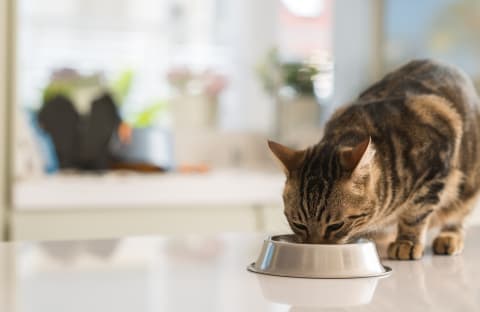Cats are notorious for being picky eaters. But, you shouldn't assume that this is the only reason your kitty isn't eating. Here, our Ventura vets explain some other possible causes and when it is time for a veterinary visit.
What does it mean if my cat won't eat?
The most common underlying cause for your cat to stop eating, is illness. However, there may also be something more affecting your cat's appetite, so you should monitor them closely. If you notice that your cat hasn't eaten after a day, you should call your vet as soon as possible. The sooner the reason for your pet not eating is identifies, the sooner your vet can start treatment and your feline companion can begin to feel better.
10 Reasons Why They May Not be Eating
- New food
- Kidney disease
- Dental/tooth pain, infections or injuries like inflamed gums, an abscess, a broken tooth, or oral tumors that can cause pain when chewing
- Gastrointestinal issues (including parasites, colitis, gastroenteritis, or cancer)
- Pancreatitis
- Recent vaccination or medication
- Digestive obstruction, indigestion, or constipation
- Anxiety, stress, or depression (this includes major changes to your cat's routine or home)
- Metabolism might be slowing down, especially in older cats
- They might be full (outdoor cats often find things to eat when outside)
How long can my cat go without eating?
Just like in people, our feline friends are able to go longer without food than without water. Cats are able to survive for two weeks without a meal, but only three days without water. The longer your cat goes without their proper nutrition, though, the weaker they will become. Because of this, you should contact your veterinarian if your cat hasn't eaten for a full day or more. Your vet will be able to diagnose the cause of this behavior and get your cat back on track with their diet.
How can I get my cat to eat?
There are several things you can try to see if your cat will begin eating again.
- Cat's don't like cold food, so you can try heating it (just be sure to mix carefully after to avoid overly-hot areas).
- Give them canned or "wet" food, or meat baby food.
- Considering stress can be a cause, ensure their dish is in a quiet area.
- Check to make sure both their food and water bowls are clean.
- Try drenching their solid food with the juice from a tuna can.
When to Seek Veterinary Care
Most of the potential reasons why your cat might lose their appetite are serious medical issues. Your vet can help to determine the best plan of treatment for your cat.
The reasons why your cat has stopped eating can vary greatly, but despite the cause, it's important to bring your cat to your vet if it lasts more than 24 hours. It's also extremely important to monitor and contact your vet if they are not drinking or are displaying other symptoms or behavioral changes.
Are you worries about your cat's noticeable loss of appetite? Contact our Ventura specialty and emergency clinic today for more information or to inquire about referrals.
Looking for a veterinary specialist in Ventura?
We're always accepting new patients, so contact our veterinary hospital today to book your pet's first appointment.Related Articles View All
Is My Cat Overweight?
You may just think of your cat as cute a cuddly, but carrying some extra weight—even just a few ounces—can impact their long-term health. Here, our Ventura vets can explain how to tell if your cat is overweight and what to do to help your cat maintain a healthier weight.
Fungal Infections in Cats - Types, Causes & Treatments
Fungal infections can pose a serious health threat for our feline friends. In some cases, your cat's fungal infection could even be passed along to you and your family. Our Ventura vets explain some causes, symptoms and treatments for fungal infection in cats.
Cat Urinary Tract Infection - What You Need To Know
Although they are rare when compared to the occurrence of Urinary tract infections in dogs, older cats may experience UTIs or other urinary tract issues that cause similar symptoms. Here, our Ventura vets share the causes, symptoms and treatments for these infections and related diseases in cats.
The Types and Symptoms of Anemia in Cats
Our VMSG veterinary team will describe here the different types of anemia in cats and offer some information about their symptoms and what to do if you suspect your cat has anemia in the Ventura area.

